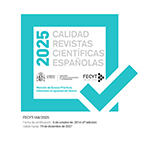Colonización antiutópica. Normalización y desarraigo de lo indeseable. (Reflexiones poscoloniales en torno a la Transición española)
Resumen
La crítica poscolonial ha tenido una prolongada y profunda aceptación entre los científicos sociales y los humanistas en las últimas décadas; sin embargo, su espectro ha quedado habitualmente enmarcado en territorios para los cuales había nacido: mundos procedentes de las dos oleadas colonizadoras de Europa y procesos poscoloniales con sus evidentes huellas neocoloniales. En este artículo el propósito es extender los argumentos y el utillaje teórico de la crítica a un terreno inusual de la misma: la Transición española y el relato hegemónico que, de alguna manera, colonizó el pensamiento de muchos españoles incluso hasta la actualidad. Como se defenderá en sus páginas, dicho pensamiento arrinconó otras memorias posibles, desvirtuó otras formas utópicas de estar en el mundo y legó un tipo de subjetividad poco cívica, consumista y ensimismada con un hoy, al parecer, irrenunciable.
Descargas
Descarga artículo
Licencia
La revista Política y Sociedad, para fomentar el intercambio global del conocimiento, facilita el acceso sin restricciones a sus contenidos desde el momento de su publicación en la presente edición electrónica, y por eso es una revista de acceso abierto. Los originales publicados en esta revista son propiedad de la Universidad Complutense de Madrid y es obligatorio citar su procedencia en cualquier reproducción total o parcial. Todos los contenidos se distribuyen bajo una licencia de uso y distribución Creative Commons Reconocimiento 4.0 (CC BY 4.0). Esta circunstancia ha de hacerse constar expresamente de esta forma cuando sea necesario. Puede consultar la versión informativa y el texto legal de la licencia.











